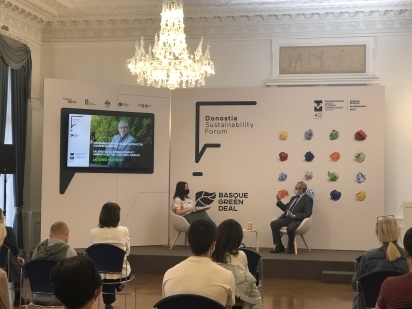Improving citizens' environmental awareness
<p> The Donostia Sustainability Forum, organized by the Summer Courses of the University of the Basque Country and the BBVA Foundation, received Antonio Vercher in one of its sessions open to the public. Vercher is a Prosecutor of the Coordinating Prosecutor's Office for the Environment and Urban Planning since 2006. </p>

Throughout his speech, he analyzed the recent history of environmental legislation, the changes experienced in the last 15 years of practice, since the creation of a specialized prosecutor's office in the field, and some recent milestones, such as the Law on climate change and the draft Law on waste. In this sense, Antonio Vercher highlighted the "extraordinary efforts" being made and the results, unthinkable a few years ago, that are being obtained.
Throughout his talk, Prosecutor Vercher made several references to the novelty of the concept of environment itself. Although environmental problems have always existed and, on some occasions in the past, legislation was passed in relation to illegal logging or forest fires, the economic vision always prevailed. Even after the industrial revolution, when resources were illegally extracted on a massive scale and all kinds of abuses were committed, it was not until the 20th century that certain intellectuals called attention to the problem. It was then that the idea of transferring this type of crime, limited to administrative legislation, to criminal law was defined.
One of the milestones highlighted by Antonio Vercher took place in 1977 when the Council of Europe proposed the need for all member states to start working on the use of criminal law to combat environmental crimes. He anticipated the importance of the specialization of judges and prosecutors in this area and even suggested avoiding the use of pardon measures for environmental offenders.
A year later, the Spanish Constitution of 1978 included mechanisms for the protection of the environment and explicitly expressed the possibility of using criminal law to deal with certain crimes. In 1983 the first environmental crime was defined, aimed at prosecuting emissions or discharges of a serious nature, and since then successive reforms of the criminal code have incorporated this type of criminal procedure in greater detail, incorporating the directives of the European Union.
The specialization of prosecutors, finally, took place in 2006 and, as Antonio Vercher pointed out, was implemented, above all, to tackle urban corruption. At present, the fact that they obtain 1000 convictions a year, the highest number in this type of cases in Europe, attests to the importance of the work they carry out. A complex work because, as he explained, 20,000 administrative regulations can have an influence on environmental criminal law, to which must be added the recently approved Law on climate change and the future Law on waste.
The experience of Madrid Central
The recently approved Climate Change Law contemplates the implementation by 2023 of low-emission zones in Spanish cities with 50,000 or more inhabitants, which will have to implement measures to prevent pollution in the center of their urban centers, restricting the access of non-resident vehicles. This experience was developed from November 2018 to July 2020 in the center of Madrid, when the regulation was annulled by the Supreme Court due to a formal defect. As of today, Vercher explained, "we do not know if Madrid Central exists or not." Measurements taken between January and September 2019 indicate that there were 40 and a half million illegal vehicle accesses. They identified the most recurrent violators and prepared documentation to denounce them, until the work was put on hold due to the Supreme Court.
Madrid Central illustrates one of the points of the new Climate Change Law. The accumulated experience will be, in Vercher's opinion, of great use when it is implemented, although he pointed out the burden of the administrative bases for criminal law.
Draft Waste Law
The future Waste law favors the introduction of the circular economy, which implies that everything that is usable should be recovered. The new law will serve to put a stop, as the prosecutor pointed out, to the export of waste to other countries, especially to Southeast Asia. When these countries refuse to accept them, the waste containers are returned to Spain and toxic and hazardous waste is deposited and often set on fire. The new law proposes the creation of a new waste recycling and treatment network throughout the country.
Throughout his speech, Antonio Vercher insisted on the importance of improving the environmental awareness of citizens. "As the consequences of these crimes are not seen in the short term, the causal relationship, which is much more evident and immediate in other crimes, is not noticed". And he added: "the 93,000 deaths that the Observatory of Health and Environment talks about in relation to atmospheric pollution do not seem to have an impact on us".
Antonio Vercher added that after conjunctural situations, such as the Prestige catastrophe, citizens tend to file more complaints, and pointed out that fines are not very discouraging for offenders, "because people have to be prosecuted so that they pay".
As for the typology of crimes that end in conviction, he explained that most of them have been related to urban planning crimes, such as the granting of illegal licenses, "Now there has been progress in this sense, although there is still a lot of shenanigans", he added. There has also been an extraordinary increase in cases related to the mistreatment of pets.
Looking to the future, in addition to awaiting the application of the new laws on Climate Change and Waste, Antonio Vercher highlighted the fact that the EU has decided to regulate the matter criminally, involving the 27 member states in the fight against crimes against the environment.

